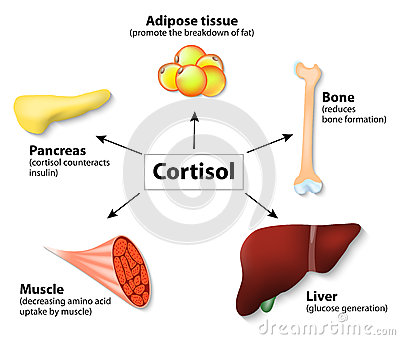A Comprehensive Guide to the Science Behind Cortisol Production
Prof. Aécio D’Silva, Ph.D.
AquaUniversity
Cortisol, often referred to as the “stress hormone,” is a key player in our body’s stress response system. It is responsible for several critical functions in our body, including regulating blood sugar levels, controlling inflammation, and assisting with memory formation. However, when cortisol levels become chronically elevated, it can lead to a range of negative health consequences, including weight gain, mood disorders, and impaired immune function.
Cortisol The Stress Hormone – Have you ever experienced that sudden rush of adrenaline when you’re in a stressful situation? That’s your body’s fight or flight response kicking in, and cortisol is a significant part of that response. Cortisol is a hormone produced by the adrenal glands in response to stress. It plays a crucial role in helping our body cope with stressors and restoring balance once the stressful event has passed. But how exactly is cortisol produced in our body? In this blog post, we will dive into the science behind cortisol production and explore the complex processes involved.
Cortisol The Stress Hormone – Cortisol Production in the Body
Cortisol production is a complex process that involves several steps. It starts in the hypothalamus, a small region in the brain that plays a crucial role in regulating our body’s stress response. When we encounter a stressor, such as a loud noise or a stressful situation, the hypothalamus sends a signal to the pituitary gland, a small gland located at the base of the brain. The pituitary gland, in turn, produces adrenocorticotropic hormone (ACTH), which travels to the adrenal glands, located on top of the kidneys.
Once ACTH reaches the adrenal glands, it stimulates the production and release of cortisol. Cortisol is released into the bloodstream, which travels to different body parts to help us cope with stress. When cortisol levels in the blood become too high, the hypothalamus and pituitary gland sense this and reduce the production of ACTH, which in turn reduces cortisol production.
Cortisol The Stress Hormone – Factors Affecting Cortisol Production
Several factors can affect cortisol production in our bodies. Stress is the most significant factor that stimulates cortisol production. However, other factors like diet, exercise, and sleep can also affect cortisol levels. For example, a diet high in sugar and refined carbohydrates can lead to chronically elevated cortisol levels. Regular exercise, on the other hand, can help regulate cortisol levels and reduce stress.
Chronic stress is particularly problematic when it comes to cortisol production. When cortisol levels remain high for extended periods, it can lead to a range of negative health consequences, including weight gain, mood disorders, and impaired immune function.
Cortisol Imbalances and Health Consequences
When cortisol production becomes imbalanced, it can lead to a range of health consequences. Chronic stress and elevated cortisol levels have been linked to several health problems, including anxiety, depression, obesity, and diabetes. High cortisol levels can also suppress the immune system, making us more vulnerable to infections and illnesses.
On the other hand, low cortisol levels can also cause health problems, particularly in people with Addison’s disease, a rare condition in which the adrenal glands don’t produce enough cortisol. Symptoms of low cortisol levels can include fatigue, weakness, weight loss, and low blood pressure.
Managing Cortisol Levels
The good news is that several strategies can help manage cortisol levels in the body. These strategies include regular exercise, stress reduction techniques such such as meditation and deep breathing (478-Psalm 23), and a healthy diet that is low in sugar and refined carbohydrates..
In conclusion, cortisol is a vital hormone that plays a crucial role in our body’s response to stress. The complex process of cortisol production begins in the hypothalamus and ends in the adrenal glands. While cortisol is essential for our survival, chronically elevated levels of cortisol can have negative impacts on our health. Therefore, it is crucial to find ways to manage stress levels and maintain a healthy lifestyle to keep cortisol levels in check. By understanding the science behind cortisol production, we can take steps to manage our stress levels effectively and ensure our bodies remain healthy and balanced.



Thank you so very much Professor for this information very helpful on my Journey Forward…God Bless